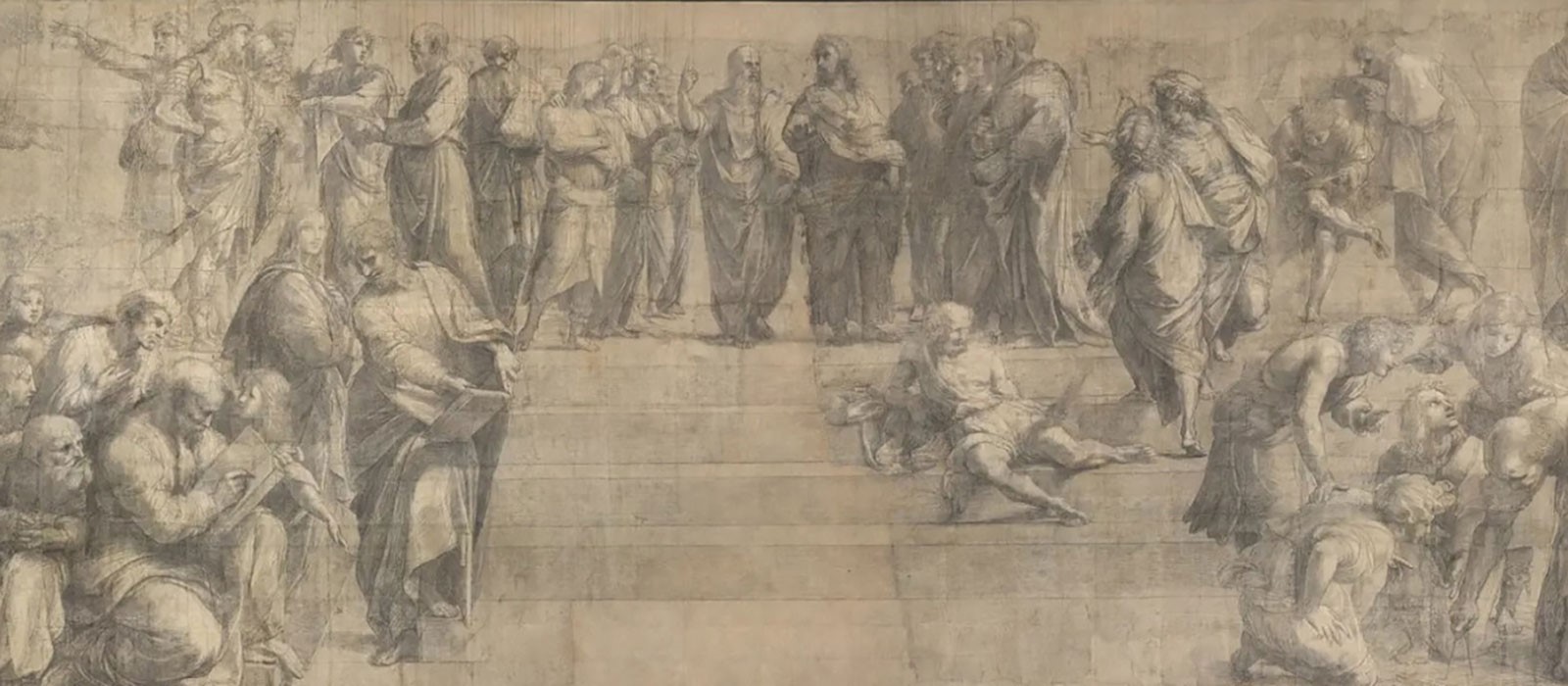- Greetings from the Director, Shane Hawkins
- News from Faculty and Staff
- Alumni News
- College News
- Student Spotlight
- Support the College
Greetings from the Director, Shane Hawkins
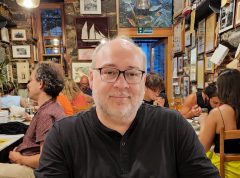 Greetings to all and welcome to the very first newsletter from the College of the Humanities! We hope this is a way to keep you informed about the College and for you to stay in touch with us. We intend to produce two newsletters per year, one in each academic term. In our inaugural issue you will find some news about the College, updates from some of our faculty and staff, and a profile of one of our current students.
Greetings to all and welcome to the very first newsletter from the College of the Humanities! We hope this is a way to keep you informed about the College and for you to stay in touch with us. We intend to produce two newsletters per year, one in each academic term. In our inaugural issue you will find some news about the College, updates from some of our faculty and staff, and a profile of one of our current students.
Having returned this fall to the College after a sabbatical, I am quite excited for the opportunity to serve a second five-year term as Director of this excellent program. What do professors do during a sabbatical? Well, if the sabbatical is during a world-wide pandemic, some of them, at least, spend a good amount of time sitting at their desks at home writing while wishing they were travelling or at least spending quality time in a huge library or archive.
For me, like many others, the last year came with some sense of withdrawal and the laboured reassessments that accompany retreat. I spent many hours in attempts to improve upon my Italian and carefully working my way through the Hollanders’ bilingual edition of Dante’s Divine Comedy. Dante’s dangerous journey somehow seemed a fitting companion for our perilous times, but also reassuring in its hopeful message and encouragement to persevere however fearsome the path ahead.
And I did eventually have a chance to get away, after all. Late in the summer I arrived in Rome with the temperatures soaring in the upper 30s. After a brief stay, I was off to Liguria, then Tuscany and San Gimignano with its famous towers. There you can visit the Palazzo Comunale and stand in the so-called ‘Sala di Dante’, the reception hall in which Dante, as Florentine ambassador, urged a political alliance on behalf of the Guelph League in 1300. A few steps away, if you enter the basilica called the Collegiata di Santa Maria Assunta, you will see walls covered in the most astounding Renaissance frescos, including the Last Judgement and the tortures of Hell painted by Taddeo di Bartolo, who clearly took inspiration from the great poet who had visited the city.
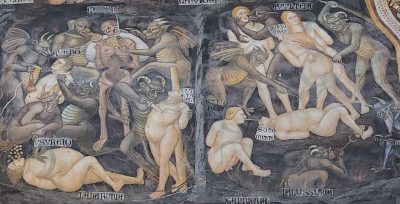
Later and in cooler temperatures, I made way to Umbria and the ancient walled town of Orvieto, built up on a large bluff of volcanic rock. The cathedral in Orvieto, as it happens also ‘di Santa Maria Assunta’, is simply beyond my power to describe. But in the chapel of the Madonna, if and when you are able to pry your eyes away from the vault painted by Fra Angelico, you will notice the tremendous frescos of Luca Signorelli, including the Damned in Hell and Resurrection of the Flesh (both ca. 1500). Below these and around the room, Signorelli has painted a profile of Dante and illustrations from the first eleven books of Purgatorio.
I had always assumed that images of such death and damnation were meant to serve as warnings for the living to remain on the straight and narrow path. I suppose it was my recent re-reading of Dante that led me to the thought that they might also be a source of unusual consolation. Like poetry in the ear and words on the page, these scenes have the power to arouse a sense of pity and an acknowledgment of the fragility of one’s own state. Whether standing in front of them you find answers or only more questions, you may recognize in them nonetheless the common lot shared by all of humanity. On the lower right wall Signorelli painted a scene of lamentation over the body of the dead Christ. Giorgio Vasari, in his renowned work The Lives of Most Excellent Painters, notes that the image of Christ is the body of the painter’s son, Antonio, who died of the plague while Signorelli completed these frescos.
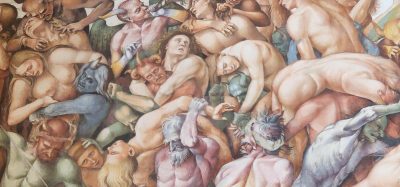
In the next newsletter, planned for the Winter 2023 term, I hope to tell you about how the faculty spent a portion of our summer rethinking and reimagining the HUMS curriculum. The student and alumni survey, mentioned by Prof. Dolansky below, provided us with more than fifty pages of material—solid advice and frank responses—from past and current students. We are very grateful to those of you who participated, and we are excited to share with you the developments that will follow from it.
In the meantime, I asked Professor Dolansky, who served brilliantly as interim Director last year, to write down some of her thoughts about what that year was like and how the College is looking forward to the future. Likewise, Professor Stratton kindly agreed to write a longer piece in order to give you a feel for how things are these days at the College.
Finally, I would like to draw your attention to a couple of new developments in the College. We have set the wheels in motion to form two new funds to support our students. The first is called the Student Experience Fund, with which we intend to support the many social and cultural events put on by the College. The second is meant to raise funds that will support students enrolled in a new Humanities summer travel course. Prof. Dolansky briefly describes the genesis of this initiative below, and you can find further details and links to our FutureFunder pages at the end of this newsletter. Charitable gifts made on Giving Tuesday, November 29, will be matched dollar-for-dollar by the University on a first-come, first-served basis starting at midnight (EST).
Shawna Dolansky, Interim Director 2021-2022
 Stepping in as Director of the College of the Humanities for 2021-22 was both extremely daunting and extremely exciting. Having enjoyed the privilege of hanging around COH and especially of teaching Hums students for the last ten years, it was an honour to be able to give back to the community of colleagues and students that has sustained me through some trying times. But as a relative newcomer to the College, and as one becoming an administrator during a global pandemic, I really wasn’t sure how I was going to stay on top of everything and steer the ship.
Stepping in as Director of the College of the Humanities for 2021-22 was both extremely daunting and extremely exciting. Having enjoyed the privilege of hanging around COH and especially of teaching Hums students for the last ten years, it was an honour to be able to give back to the community of colleagues and students that has sustained me through some trying times. But as a relative newcomer to the College, and as one becoming an administrator during a global pandemic, I really wasn’t sure how I was going to stay on top of everything and steer the ship.
I’m happy to report that not only did we make it through the year intact, but we were also able to provide programming and resources to help the students thrive as much as possible in strange circumstances. I say “we” because I could not have managed it without the full-on support of the College’s administrators and my faculty colleagues. We held social activities outdoors, online, and in-person when possible. We provided peer mentors for incoming students from among upper-years, to help those new to the College integrate in a meaningful way despite the Covid-related obstacles (thanks to Andrea McIntyre & Geoff Kellow). We facilitated cultural events (special shout-out to Micheline White for coordinating all of these) for Humanities students to attend, from tours of the Ottawa Art Gallery and National Gallery in the Fall, to trips to the ballet and the symphony, and online participation in book talks by Canadian Indigenous authors, and even attendance at an one-man Zoom play, followed by a panel discussion. A career night (thanks to Kim Stratton) featured a variety of our BHum alums in a great conversation about the adaptability of a Humanities degree to any profession, and a special event spotlighting alumni who found careers in the tech industry was co-sponsored by FASS and live-streamed. And thanks to BHum alum Kwende Kefentse, Executive Director of CKCU-FM, we managed to establish summer internship opportunities for upper-year students in our Journalism-Humanities joint degree program. Recruitment efforts were also stepped up, despite the barriers to travel and in-person gatherings with online Spotlight and other events advertising the BHum. And recognizing the unique community in the College that relies on being able to be together in our own dedicated spaces, when the University moved many courses online in the Winter term, we all rallied to buck the trend, keeping 80% of our core courses in-person and making the modifications necessary in order to accommodate the covid rules for classroom capacities and continued use of the student lounge.
Our students really rose to the challenges as well – not only planning their usual activities (with covid modifications), from Humsoween to Fight Night to Formal, but also initiating and executing a new publication: thanks to Marina Nekrasova (see the Student Spotlight, below) and a team of volunteer editors, COH now boasts an interdisciplinary academic peer-reviewed undergraduate journal, Ipso Facto, in addition to our literary journal North. Several of our students received summer internships in FASS and in COH, and volunteered as Ambassadors for the program and as Mentors for first and second year students.
Although a year is not nearly enough time to do all of the things one might wish in order to give back to such an amazing community, there were two things that I put in place that I’m grateful to have been able to do. The first was a survey about the Humanities curriculum, which many of you filled out (thank you!) and which formed the basis for the Hums faculty to carefully review, update, and modify our curriculum requirements. The second was the ability to establish a Humanities student travel course that we hope to offer every couple of years, to provide our students with the opportunity to study the worlds of literature, philosophy, art, music, history, culture, and religion in situ, that otherwise they only encounter in books and in the classroom. I’m very excited to report that the inaugural version of this course is set for May 2023: Shane Hawkins and I will take students to Jerusalem, Athens, and Rome (with side-trips throughout the environs of these monumental cities) for three weeks. We initially thought we’d get 15-20 students signed up, but the response to our announcement of this trip was to receive initial deposits from 30 eager students! If you’d like to help defray costs of this amazing trip for our students, we’d love for you to visit our fundraising page here – please share it widely, and please note that donations made on November 29 (Giving Tuesday) will be funds-matched and have double the impact! Many of the students who signed up for the trip are trying to overcome significant barriers to attending; they are doubling their work-shifts, finding weekend jobs, taking out loans, and begging their parents and grand-parents for financial help, because this opportunity is such an exciting one for them. There is nothing like being able to actually experience the spaces, the people, and the artifacts that we study by being there. If you can help our students to enrich the material they have learned by participating in this travel course, we would all be so very grateful to have your help in realizing this dream.
I am so grateful to have had the opportunity to work with students and colleagues in keeping the College a welcoming, thriving, and all-around wonderful place to be over the past year. And I’m even more grateful to Shane Hawkins for coming back as Director for another term! I wish you all a wonderful holiday season and end to 2022.
Kim Stratton
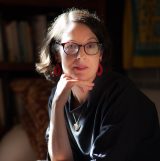 The past two years presented a number of significant challenges to the College of Humanities as we shifted to virtual delivery of our courses. Despite the hurdles, Noel and I managed to keep Hums 1000 on the rails on zoom, using break-out rooms, polls, and other tools to keep the virtual format engaging, while trying to build a cohort and develop meaningful relationships with and among the first-year students. Continuing the cultural life of the College and fostering cohesion between cohorts posed the biggest challenge, which we addressed with a variety of online events such as trivia night, pictionary, Halloween costume competitions on Instagram, etc. While there were some advantages to teaching online (no commute, pyjama bottoms under a dressy jacket, etc.), I am thankful to be back on campus and feel energized everyday by the vivacity and curiosity of Hums students and the warm collegiality of my colleagues, many of whom have shared this journey with me for 20 years (I just celebrated my 20th anniversary at Carleton!).
The past two years presented a number of significant challenges to the College of Humanities as we shifted to virtual delivery of our courses. Despite the hurdles, Noel and I managed to keep Hums 1000 on the rails on zoom, using break-out rooms, polls, and other tools to keep the virtual format engaging, while trying to build a cohort and develop meaningful relationships with and among the first-year students. Continuing the cultural life of the College and fostering cohesion between cohorts posed the biggest challenge, which we addressed with a variety of online events such as trivia night, pictionary, Halloween costume competitions on Instagram, etc. While there were some advantages to teaching online (no commute, pyjama bottoms under a dressy jacket, etc.), I am thankful to be back on campus and feel energized everyday by the vivacity and curiosity of Hums students and the warm collegiality of my colleagues, many of whom have shared this journey with me for 20 years (I just celebrated my 20th anniversary at Carleton!).
The Covid lockdown was not a complete loss, however; I have integrated some new approaches I developed to cope with the disengagement of online instruction. In Maccabees to Mohammed I dropped the 3 hour final exam and replaced it with weekly Learning Checkups and a take-home final exam/creative project. This is the first time I have tried this, and I am not sure how well the innovative approach is going to work, but so far students seem to be keeping up with weekly readings and lectures and appear far more engaged by the creative assignment/take-home exam than they were by the prospect of a 3 hour exam. The take-home project offers a few different options with the goal of demonstrating what they have learned in the course in a more creative way. The first option asks them to curate a playlist for the course, explaining the connection between each song and one of the lectures or readings. The connection may be as slim as one line of the song; that doesn’t matter. What I want to see is a fulsome explanation that shows they understand the material covered in the course. They can also write a dialogue between, or create a social media account for, characters covered in the course. Students are already proposing their own projects, such as working together to make a video and then submitting separate write up explanations for it. Their creative suggestions and enthusiastic engagement bode well for the learning potential of this assignment, and I look forward to marking them at the end of term. I am sure they will be more enjoyable than deciphering handwriting in exam books.
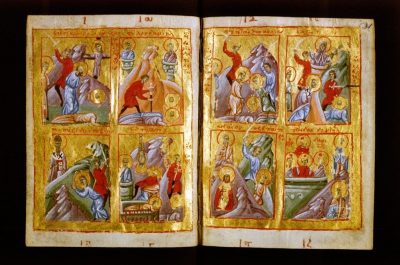 I have not taught Maccabees to Mohammed since 2016 and completely revamped the course this year to bring it more up to date with current research and discourses in the field, but also to incorporate work I am doing on the formation of Christian and Jewish identities in response to Roman violence. Later this month, I am presenting a paper at the Annual Meeting of the Society of Biblical Literature that applies Althusser’s concept of interpellation, subsequently expanded by Judith Butler to consider the power of hate speech, to understand the concretizing of Christian identity in and through persecution. Several scholars have proposed that the term “Christian” originated as a slur and often accompanied persecution. My paper tries to understand why some Jesus followers turned to embrace the slur and adopted this label as well as the suffering it implied as core to their self-identity. This, then, is the origin of “Christian”ity, and it does not include the other followers of Jesus who did not embrace martyrdom as a core principle of faith. The paper emerges from my current research on the role of violence in the formation of collective identities. In addition to a few articles, I expect to complete a book in the next year or so that is tentatively titled: From Babylon to Exodus: Violence and Story in the Formation of Jewish and Christian Identities. I will keep you posted when that comes out.
I have not taught Maccabees to Mohammed since 2016 and completely revamped the course this year to bring it more up to date with current research and discourses in the field, but also to incorporate work I am doing on the formation of Christian and Jewish identities in response to Roman violence. Later this month, I am presenting a paper at the Annual Meeting of the Society of Biblical Literature that applies Althusser’s concept of interpellation, subsequently expanded by Judith Butler to consider the power of hate speech, to understand the concretizing of Christian identity in and through persecution. Several scholars have proposed that the term “Christian” originated as a slur and often accompanied persecution. My paper tries to understand why some Jesus followers turned to embrace the slur and adopted this label as well as the suffering it implied as core to their self-identity. This, then, is the origin of “Christian”ity, and it does not include the other followers of Jesus who did not embrace martyrdom as a core principle of faith. The paper emerges from my current research on the role of violence in the formation of collective identities. In addition to a few articles, I expect to complete a book in the next year or so that is tentatively titled: From Babylon to Exodus: Violence and Story in the Formation of Jewish and Christian Identities. I will keep you posted when that comes out.
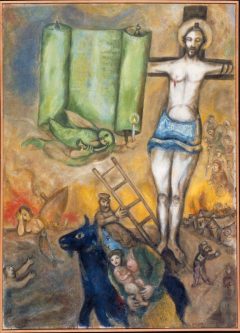
As the 30th Anniversary of the College of Humanities approaches in 2026 I look forward to seeing as many of you as can attend our anniversary celebrations. Keep an eye out for announcements about those in the next year or two. We are starting to plan a full weekend of events to reconnect with old friends, faculty, and the campus.
News from Faculty and Staff
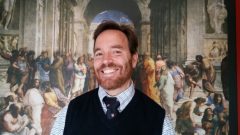 Geoffrey Kellow
Geoffrey Kellow
Professor Kellow has had an eventful year at the College. In the classroom he has been busy developing a new fourth year seminar on the cultural origins of the modern sense of self. In terms of his research, in the spring he published a new book on civic education, The Wisdom of the Commons (Palgrave MacMillan) and continues to work on a book length companion to Benjamin Franklin’s autobiography.
Gregory MacIsaac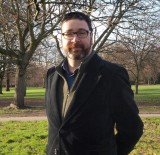
Gregory MacIsaac has recently published “The Role of the Digression on the Man of the Law Courts and the Philosopher (172b-177c) in the Argument of Theaetetus,” in Dionysius 38 (2020) pp. 8-21, and “Plato’s Account of Eleaticism: A New Interpretation of Parmenides,” in Plato’s Parmenides, ed. Luc Brisson, Arnaud Macé, and Olivier Renaut, the Proceedings of the Symposium Platonicum XII (Sankt Augustin: Academia Verlag, 2022) pp.67-74. He has two other articles under preparation, one on the ‘Dream Theory’ of the elements in Plato’s Theaetetus, and one on the initial six definitions of the sophist in Plato’s Sophist. Prof. MacIsaac and his family spent a year in Menthon-St.Bernard, a small village outside of the French city of Annecy, during his last sabbatical. A view of Lac d’Annecy and the alps made their chalet ideal. The onset of COVID while in France was less than ideal. During his sabbatical, Prof. MacIsaac completed a draft of his major research project, a philosophical commentary on Plato’s Theaetetus. He is now wading through the voluminous secondary material in order to complete the manuscript. He is of course still teaching HUMS 2000 (that’s 02.200 for you older alumni) and HUMS 1200, the ‘writing boot camp’ on Homer and Virgil that he designed over the past decade. His Humanities Writing Guide, a textbook on how to write an exegetical essay, still requires a few finishing touches before it will be ready to submit to presses for publication. He often gets to teach Plato in upper-level courses. On the family side, Eleanor is almost seven years old now (February), and Elizabeth is almost four (December), and they are both delightful. His wife, Robyn, has decided she is happy not to design websites any more, and is putting her Bachelor of Fine Arts to use in her studio, as a full-time artist.
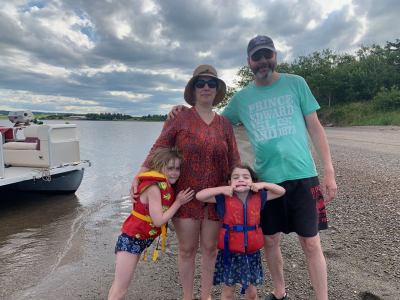
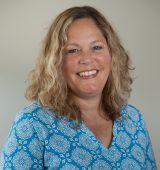 Andrea McIntyre
Andrea McIntyre
Many of you will recall what it felt like to be new to the College, hopefully fond memories of being a first year student in September. For me, January 1st isn’t New Year’s, it’s the start of term in September each year. It’s the most important month of the year at CU and the College, like a giant re-set button. Everything for students in first year is new and exciting, their energy and enthusiasm are contagious. Last year, students were on campus but with so many restrictions and so many online classes and it wasn’t quite ‘normal’. I had expected things to be the same as before the start of the Pandemic, so of course I was disappointed. I’m pleased that this year has been entirely different with our usual activities and events. The trip to Montreal was a big hit, as was the Welcome Reception and signing of (three!) College Registers. The lounge is packed and sometimes noisy again, as it should be.
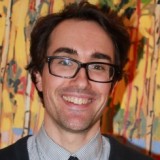 Erik Stephenson
Erik Stephenson
I have returned to the classroom this Fall after enjoying the first sabbatical leave of my career. I used my time off to write the first draft of a book on Dante’s debts to Bernard of Clairvaux. I plan to present some of the fruits of my labour at the annual medieval studies conference in Kalamazoo this Spring. But, perhaps more importantly, I used my time off to get back into tennis in a serious way – which has been very therapeutic. I’ve got my hands full this semester, since I find myself subbing for Prof. Newell in HUMS 4000 in addition to my regular Fall-semester duties (HUMS 1200 and 2000). But getting re-acquainted with some of my old loves – Nietzsche, Kierkegaard, Heidegger, Freud, etc. – has been a lot of fun.
Alumni News
Congratulations to our very recent graduates and newest alumni, Raven Griffin and Bradley Johnstone, who convocated on November 12th. Well done and very best wishes to you both!
Are you an alum with some professional or personal news you’d like to share? Keep us updated!
Do you know any prospective students who would be interested in the BHum or would you be interested in helping the College with recruiting events? You can find information here.
College News
The Digital Corpus of Literary Papyri Workshop
The College partnered with the University of Manitoba to offer a three-day practical workshop on the Digital Corpus of Literary Papyri (DCLP) in Ottawa, July 6–8 2022. The DCLP is an online database of texts and cataloging data for the ancient papyrus manuscripts of Greek and Latin literature and texts of a quasi-literary nature.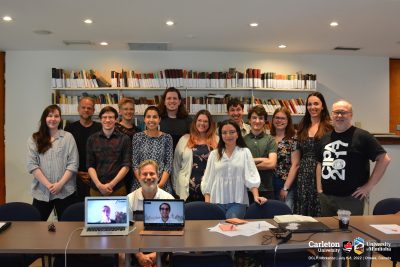
The workshop provided an introduction to digital papyrology and its tools as well as practical experience with entering and curating literary papyri at papyri.info. Participants learned how to enter metadata, translations, and transcriptions of papyrus texts. The workshop included fourteen student participants, three participating faculty members, and two faculty instructors. Dr. Sampson led the group on-site with the support of Dr. James Cowey from the Institut für Papyrologie, Universität Heidelberg, who attended via Zoom. In addition to a pair of Master’s students from the University of Manitoba’s Department of Classics, there were graduates and advanced undergraduates from Calgary, Carleton, Columbia, and Yale, as well as from universities in Italy, the Netherlands, Greece, Poland, and Texas.
As Dr. Sampson noted, “Because it is one of Classics’ most specialized sub-disciplines, with relatively few practitioners worldwide, papyrology is seldom taught to undergraduates and even to Master’s students outside of the major collections. The students in this workshop were therefore afforded a unique academic opportunity and acquired specialized experience they were unlikely to receive at their home institution. Additionally, the in-person workshop proved an important venue for networking with peers, for mentoring from faculty, and for advertising the University of Manitoba.”
Thanks to the generous support of the Social Sciences and Humanities Research Council of Canada, the University of Manitoba’s Department of Classics and Institute for the Humanities, and Carleton University’s College of the Humanities, the workshop, travel expenses, as well as accommodations and lunches were free of charge for the participating students.
Student Spotlight
Marina Nekrasova (Third-year Humanities and Philosophy)

 Last year, I initiated an academic journal focused on publishing articles by students in the College of the Humanities. The first volume of the journal, which is titled Ipso Facto: The Carleton Journal of Interdisciplinary Humanities, was published open-access online through the Carleton Library and sold in print. It features ten engaging articles spanning an array of topics from literature, philosophy, art, political theory, and music. This journal has been born out of a vision to provide the student community within the College of the Humanities at Carleton University a way to distribute their ideas and gain valuable experience and familiarity with academic publishing and the peer review process, all the while contributing to the intellectually stimulating atmosphere of the program. I highly encourage you to check out the online version here.
Last year, I initiated an academic journal focused on publishing articles by students in the College of the Humanities. The first volume of the journal, which is titled Ipso Facto: The Carleton Journal of Interdisciplinary Humanities, was published open-access online through the Carleton Library and sold in print. It features ten engaging articles spanning an array of topics from literature, philosophy, art, political theory, and music. This journal has been born out of a vision to provide the student community within the College of the Humanities at Carleton University a way to distribute their ideas and gain valuable experience and familiarity with academic publishing and the peer review process, all the while contributing to the intellectually stimulating atmosphere of the program. I highly encourage you to check out the online version here.
In addition to starting this journal, I am currently involved in reviving the annual Humanities Colloquium, which has not been running since the start of the pandemic. The money raised from selling the first volume of Ipso Facto will be used to fund this endeavour.
Since the summer, I have also been conducting my own line of research outside required coursework under the supervision of Dr. Andrew Brook and in consultation with Dr. Josh Redstone. My primary interest is in the Philosophy of Artificial Intelligence and human-robot interaction. I am fascinated by how we perceive artificial intelligence, both actual and hypothetical (i.e., artificial intelligence portrayed in literature, media, and popular culture) and in exploring relationships between A.I. and Religious studies. My first research project, done under the CUROP Summer Internship, was titled Unconscious Motivations Behind and Reactions to Artificial General Intelligence as Revealed by Religious Artwork and Eschatological Language. In this project, I argue that we possess a psychological drive to have super intelligent beings present in our world, whether they take the form of religious beings or machines. This drive reveals itself through artefacts that function as symbolic external presentations of our drive, most often in religious contexts. The same drive is expressed through our motivation to create advanced artificial intelligent systems such as Artificial General Intelligence (A.G.I.) and Artificial Super Intelligence (A.S.I.). My current research, done under the I-CUREUS program and titled Unconscious Motivations Behind and Reactions to Artificial General Intelligence as Revealed by Psycho-Physiological Reactivity: A Pilot Study Using Experimental Philosophy, expands on my CUROP research. In it, I draw on experimental philosophy and experimental psychology to solidify my theory with empirical evidence. The experimental component will involve conducting research using volunteers by measuring their psycho-physiological reactivity (via locally sourced biofeedback technologies) to artifices that are perceived by us as archetypal super-intelligent beings as depicted by religious works of art in various forms, eschatologically based language, and anthropomorphic A.I. The data from these measurements based on conscious states will be garnered by the in vivo use of heart rate variability (HRV), a form of biofeedback which accesses the peripheral nervous system using a non-invasive infrared probe. The HRV data has proven to be a reliable and valid measure of psycho-physiological states in reaction to stimuli. The data gathered will be correlated with information gathered from responses to sets of surveys designed to detect subconscious inclinations and biases towards the same subject matter.
I have also been fortunate to be involved in the Students and Partners Program in the summer of 2021, working for Dr. Kimberly Stratton on restructuring her course RELI 4741: Contemporary Issues in Religion. This opportunity gave me insight into how a course is designed and allowed me to research experiential learning approaches, write weekly quizzes, provide input on assigned projects, and find supplementary materials to help students understand the difficult materials assigned in the class.
Marina takes the Proust Questionnaire
Support the College
The College has introduced two new initiatives that we hope you will consider supporting.
Please note: gifts made on November 29 will be matched dollar-for-dollar by the University on a first-come, first-served basis starting at midnight (EST). Every gift made through FutureFunder is a charitable donation, and will be eligible for a tax receipt. Carleton does not charge any fees on donations, and 100% of the value of your gift will go directly towards the project/fund that you are supporting.
Student Experience Fund
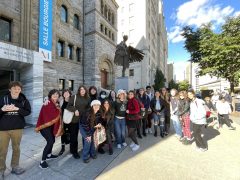 Even though the BHum is a ‘Great Books’ program, from its founding the College has committed itself to educating the entire student, and this must include social and educational opportunities outside the classroom, in our community, in our cultural institutions, and in the world at large. In the classroom our curriculum includes the performing and visual arts and architecture. The Student Experience Fund will allow students to acquire a greater appreciation of these important components of their degree through first-hand experiences.
Even though the BHum is a ‘Great Books’ program, from its founding the College has committed itself to educating the entire student, and this must include social and educational opportunities outside the classroom, in our community, in our cultural institutions, and in the world at large. In the classroom our curriculum includes the performing and visual arts and architecture. The Student Experience Fund will allow students to acquire a greater appreciation of these important components of their degree through first-hand experiences.
Social life and classes are two sides of the same educational coin in the Bachelor of Humanities program, and students ought to enjoy a rich calendar of social and cultural events designed to complement the more formal aspects of their education. Every year the Humanities faculty and students work diligently to make sure that such opportunities are available in the College. The BHum Student Experience Fund will be used to support a variety of cultural activities and learning opportunities for our students, including events and tours at the National Arts Centre and National Gallery, the annual trip for first-year students to Montreal (Musée des beaux-arts and a concert), the third-year student trip to cultural institutions in New York City (the Met, Cloisters, MoMA, etc.), student internships with our campus radio station CKCU, regular events planned by the Humanities Social Society, and our student publications North (our literary journal) and Ipso Facto (a journal of interdisciplinary humanities). Support for these activities will allow the College to subsidize costs for all students, particularly those in financial need.
To find out how to contribute to the Student Experience Fund, please visit our FutureFunder page here.
Humanities Travel Course: HUMS 3800 Humanities in Context
Designed for students studying humanities, this travel course explores art, literature, politics, philosophy, architecture, religions, and cultures in their historical and contemporary contexts in a particular geographic locale. Travel destinations and themes will vary from year to year. Our first course, in May 2023, includes a 22-day itinerary that will take students to Jerusalem, Athens, Rome, and the environs of these historic and monumental cities, and will explore the formation of identity in the past and present through reflection on the history of the various sites, and the modern constructions of that history, through the lenses afforded by the unique course of study offered in the BHum.
Many of the “great books” that form the core of BHum courses originate in places and times far different from ours. Traveling to the places of their origin inspires a deeper appreciation of the cultures that produced them than is possible in the close reading and analysis promoted in classroom study alone. This course allows students to experience the cultures and concomitant art and architecture of geographical locations studied in the BHum, in addition to visiting historical and archaeological sites that are central to a deeper appreciation of the literary products that emerged from these places.
To support HUMS students on this trip, please visit our FutureFunder page.

